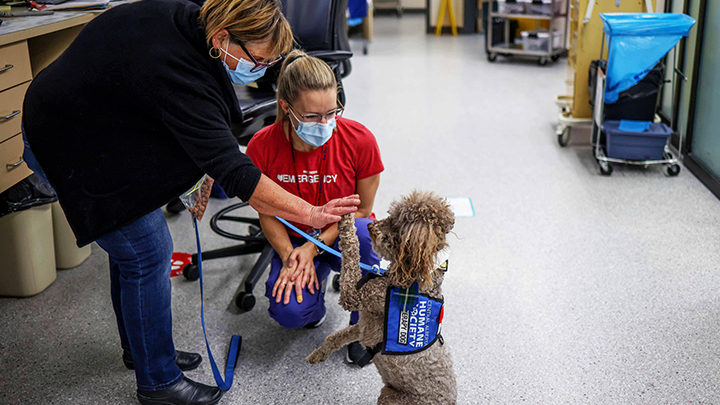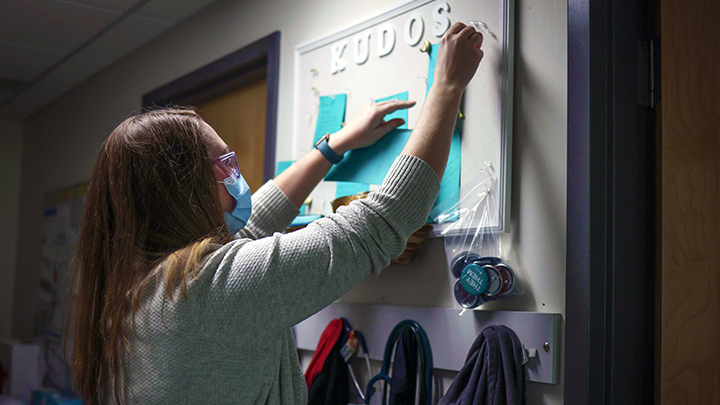
January 31, 2022

Sandy Polis, a volunteer at Red Deer Regional Hospital Centre, gets a high-five from Teddy the dog as part of pet visitation for staff during the pandemic.

Peer support team lead Natalie Anderson fixes the kudos board in the physician breakroom in the emergency department at Red Deer Regional Hospital Centre.
Story Yolanda Genu | Photos by Leah Hennel
RED DEER — Staff at Red Deer Regional Hospital Centre’s (RDRHC) emergency department have developed a peer-support program to lean on one another through these tough times.
“We noticed when COVID started, our staff were feeling more isolated, and less connected to each other than we had been before,” says Natalie Anderson, a registered nurse and peer support team lead for RDRHC’s emergency department and Sylvan Lake Advanced Ambulatory Care.
“We used to be able to go into the break room and have lots of people laughing and joking, but now have a limit of five, and we must be distanced, and we can’t share food anymore — so we had to look for new ways to bring some of that joy back, to connect and make our way through challenges.”
The program’s primary goal is to support colleagues after critical incidents or in difficult work situations. The team provides confidential peer-to-peer support, post-incident debriefs and assistance to connect with professional support when requested.
One of the initiatives gathers staff regularly via Zoom to allow for specific debriefs, or to generally touch base with them about how they’re navigating the pandemic.
“That is so important for morale, and especially in the work that we do,” adds Anderson. “We see a lot of things that are hard to look at, and sometimes talking to each other about those things is the way through it.”
The team is also working on setting up Zoom meetings so staff can gather for fun activities such as cooking classes, yoga or crafts.
They also have a “kudos corner” — two bulletin boards in the physician and staff break rooms — which provide space for colleagues to post handwritten notes of encouragement or gratitude for one another.
“Sometimes, it’s about a nurse having a rough shift, or it’s someone who’s thankful for something that happened, and it’s just a way to change the perspective into a positive,” says Anderson.
Another way staff showed recognition for one other was through their 30 days of gratitude initiative. Late last year, nurses and support staff were invited to place their names in a draw for a daily prize, courtesy of department physicians. The peer-support program places emphasis on staff recognition, as having their hard work acknowledged by colleagues gives meaning, a sense of belonging and connection across teams.
Another well-received initiative is the pet visitation program, offered by Volunteer Resources. Three days a week, one of three friendly dogs and their handlers drop by to visit staff in emergency, making meaningful connections and promoting healing.
“Staff appreciate this program. A few minutes of these visits provide comfort and a sense of gratitude,” says Brenda Farwell, co-ordinator, Volunteer Resources at RDRHC.
Staff have said they are grateful for these precious moments every day, while others said that a few minutes of “dog conversation” or a fur-baby hug is balm for their soul.
Volunteer dog handler Sandy Polis consistently receives thanks from all for the few minutes of chill time a friendly pooch provides.
“It’s just a little momentary break from the stress of the day,” adds Polis, who intimately understands the need to de-stress, thanks to her 35-year career as a psychiatric nurse prior to retirement.
“I’ve had so many people tell me they were having a bad day and Teddy, or one of the other dogs, just turned it around. It makes a world of difference.”